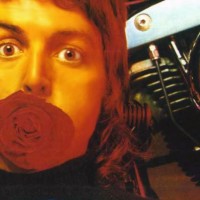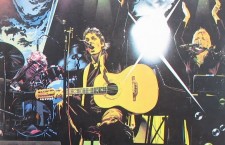Let’s hand the reins over to Henry McCullough, singer-songwriter and former sideman with Paul McCartney and Wings, Joe Cocker and Spooky Tooth, among others. Go inside the sessions with Wings that produced his first-take, oh-so-cool guitar solo amidst the lovey-dovey schmaltz of “My Love.” Find out what it was like to be onstage with Joe Cocker at Woodstock, and how a misheard ZZ Top lyric led to this burst of late-career inspiration. Then, there’s the story of how McCullough came to make an unlikely appearance on Pink Floyd’s “Money” …
“MY LOVE,” with Wings (RED ROSE SPEEDWAY, 1973): This heavily orchestrated gold-selling ballad shot to No. 1 in the U.S., and reached No. 9 in the UK. It’s most memorable element, however, came courtesy of McCullough, who fought for his own solo moment on the song — then had to nail it live in the studio. McCartney’s no-doubt stunned response, he later admitted was: “F—king great.”
HENRY McCULLOUGH: It was like playing a hand of cards, and having a royal flush. Paul had this particular thing that he wanted me to play. That was the point of no return. I said: ‘I’m sorry, I can’t do this. I have to be left as the guitar player in the band. I want to have my own input, too.’ He says: ‘What are you going to do?’ I didn’t know. I simply said: ‘I’m going to change things.’ I was half terrified, half excited. I just started playing, and that’s how it turned out — just as you hear it. That flabbergasted Paul, and there was just silence for a while. I thought: ‘Uh oh, I have to do it again.’ Paul came over and said: ‘Have you been rehearsing?’ (Laughs.) I liked to have that freedom. I wanted to put my cards on the table. He asked me in the band, but I didn’t want him to tell me what to play.
[SOMETHING ELSE! INTERVIEW: Henry McCullough talks about his time with Paul McCartney and Wings, Joe Cocker and the Grease Band and how addiction almost cost him everything.]
“FAILED CHRISTIAN,” solo (UNFINISHED BUSINESS, 2011): McCullough entered the new millennium with a renewed sense of purpose, having overcome a longtime bout with alcoholism and a related hand injury that nearly ended his career. Perhaps as expected, McCullough’s initial forays back into songwriting had a decidedly introspective bent — none more so than “Failed Christian,” this heart-rending exploration of faith’s ups and downs that has already been covered by Nick Lowe on the album ‘Dig My Mood.’
HENRY McCULLOUGH: I had the title before I had the song. I was listening to the radio, doing things, and I heard ZZ Top in the background. I thought they were singing about failed Christians, but it was actually something to do with a pin cushion. If you said them one after the other, it had the same ring about it. I kept the title, and it wasn’t very long before I finished it off. I don’t know many people who aren’t failed Christians in some way. The last verse of it is really where the story is at: I know a lot of people who go to church and the rest of the week there would be no Christianity about them whatsoever. For me, I felt that what I do musically and otherwise was enough to warrant a place in heaven. At least I have admitted my mistakes. Someday, I’ll go to meet me maker, but I’ll do it as a firm believer in song.
“MONEY,” with Pink Floyd (DARK SIDE OF THE MOON, 1973): Notable for its unusual rhythmic signature, the sixth track from this psychedelic rock band’s most recognizable release was the only one to enter the Billboard Top 20. McCullough appears toward the end of the song, as part of a series of spoken-word snippets, famously saying: “I don’t know; I was really drunk at the time.”
HENRY McCULLOUGH: People still come up to me at different times to talk about that. Wings were in Studio 1 at Abbey Road, and Pink Floyd were doing Dark Side in Studio 2 right across the hall. They asked Paul to do a little bit of work on it with them. He said: ‘Henry, I’m busy. Nip across and see what the lads want.’ I go over, and they have six questions on pieces of paper, face down. For whatever reason, they wanted me to answer one — and the first thing you said was going to be recorded. They wanted something spontaneous. My piece of paper said: ‘When was the last time you had a fight with your wife?’ (Laughs uproariously.)
“WITH A LITTLE HELP FROM MY FRIENDS,” with Joe Cocker (LIVE AT WOODSTOCK, 2009): Originally part of the Beatles’ ‘Sgt. Pepper’s Lonely Hearts Club Band,’ this Lennon-McCartney composition was dramatically rearranged into a slow-cooking raveup by Cocker. Later, it became one of the signature moments of the decade-defining Woodstock festival. This live version, which featured McCullough as part of Cocker’s backing group the Grease Band, was the closing song of the first set on the Aug. 17, 1969, the final day of the event — and a highlight of the subsequent documentary film.
HENRY McCULLOUGH: It wasn’t as nerve wracking as people might think. We knew that this was a very special event. In that way, it was stunning. You were not that far from the front row, and there were thousands of people there. And it ended up being one of the strongest points in the movie. For the event itself, though, we flew in from 20 miles away in a helicopter. You play and an hour later you are whisked out and then off to somewhere else. It was all very quickly done. None of the Grease Band or Joe got to go out front or watch anybody. All that we saw was from the stage, until the movie came out.
“LIVE AND LET DIE,” with Wings (single release, 1973): The main theme song from the initial James Bond film to star Roger Moore, “Live and Let Die” became a Grammy- and Academy Award-nominated, gold-selling single. Recorded during the sessions for ‘Red Rose Speedway,’ the track went to No. 2 in the U.S. and No. 9 in Britain, and opened the door for a gala experience at the film’s Hollywood opening. Wings had finally, completely made it. Yet, not long after that, McCullough abruptly quit — fed up, he says, with trying to elbow his way into the creative process.
HENRY McCULLOUGH: I never thought about it twice. We were supposed to go off to Lagos (for the scheduled sessions that would produce Band on the Run), and about a week before, I walked out. I regret that, the way that I did it, because it was probably the most unprofessional thing I’ve ever done in my life. That created a ripple, though, and (longtime Wings drummer) Denny Seiwell walked out, too. I had been around for a long time, though. Very quickly, it was all ironed out. (Among his many subsequent early 1970s projects was a reunion with the Grease Band.) Once I got used to being scarce, it wasn’t a problem at all. (Laughs.) That subsides over time. Everything passes so quickly. It just wasn’t going to work out for the rest of us in Wings — until, of course, you had an apron on, if you know what I mean.
- How Deep Cuts on ‘Music From Big Pink’ Underscore the Band’s Triumph - July 31, 2023
- How ‘Islands’ Signaled the Sad End of the Band’s Five-Man Edition - March 15, 2022
- The Band’s ‘Christmas Must Be Tonight’ Remains an Unjustly Overlooked Holiday Classic - December 25, 2016




